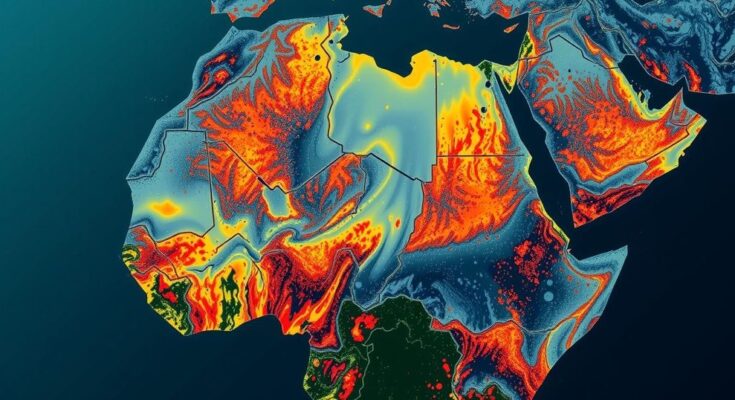A recent study reveals that climate change has intensified rainfall in flood-stricken regions of Africa, resulting in significant humanitarian crises. Global warming has increased seasonal downpours by 5-20% in areas such as Cameroon, Chad, Niger, Nigeria, and Sudan. Recent floods have caused 1,500 fatalities and displaced over 1 million people, with expectations of more annual occurrences of extreme rainfall if temperatures continue to rise. The urgency for investment in infrastructure and climate finance is highlighted as critical.
Recent research conducted by a team of international scientists indicates that devastating rainfall, which has resulted in deadly flooding across regions in Africa including Cameroon, Chad, Niger, Nigeria, and Sudan, has been exacerbated by human-induced climate change. According to the World Weather Attribution (WWA), the global rise in temperatures has intensified seasonal rainfall this year by approximately 5-20% across the Niger and Lake Chad basins, setting a concerning trend for the future. The scientists predict that if global warming continues unabated, such severe rainfall events could become a yearly occurrence. Izidine Pinto, a researcher at the Royal Netherlands Meteorological Institute, emphasized the alarming shift in weather patterns: “Spells of heavy summer rainfall have become the new normal in Sudan, Nigeria, Niger, Cameroon and Chad.” The consequences of these extreme weather events have been dire; recent floods have resulted in the deaths of around 1,500 individuals and displaced over 1 million people in West and Central Africa, as reported by the United Nations Office for the Coordination of Humanitarian Affairs (OCHA). The rainfall has caused significant issues, including overwhelming dams in Nigeria and Sudan, exacerbating the impact of these floods. The WWA cautions that should global temperatures rise by 2 degrees Celsius (3.6 degrees Fahrenheit), a threshold projected to occur by the 2050s, these extreme downpours might take place almost every year in the affected areas. To address this escalating crisis, the scientists have urged increased investments in early warning systems and upgrades to existing dam infrastructure. Joyce Kimutai, a researcher at the Centre for Environmental Policy at Imperial College London, noted, “Africa has contributed a tiny amount of carbon emissions globally, but is being hit the hardest by extreme weather,” underscoring the disproportionate impact of climate change on African nations. She stressed the importance of the upcoming COP29 climate talks in November, calling on wealthier nations to provide “meaningful finance” to assist affected regions.
The link between climate change and extreme weather phenomena has become a focal point of scientific research, particularly as the consequences of global warming increasingly manifest in vulnerable regions. Africa, despite contributing minimally to global carbon emissions, is experiencing some of the most severe impacts of climate change. Seasonal rains that once followed predictable patterns have become more erratic and intense, contributing to catastrophic flood events. Understanding these dynamics is critical for developing effective mitigation and adaptation strategies, particularly in light of upcoming international climate discussions.
In conclusion, the alarming increase in rainfall intensity in flood-affected African regions is directly linked to human-induced climate change, resulting in severe humanitarian crises. The call for global investment in infrastructure and preparedness measures is urgent, as is the need for developed nations to fulfill their financial commitments to support those most affected by this global challenge. It is imperative that the international community recognizes the disproportionate effects of climate change on vulnerable populations and takes decisive action to address these disparities.
Original Source: www.cnbcafrica.com




